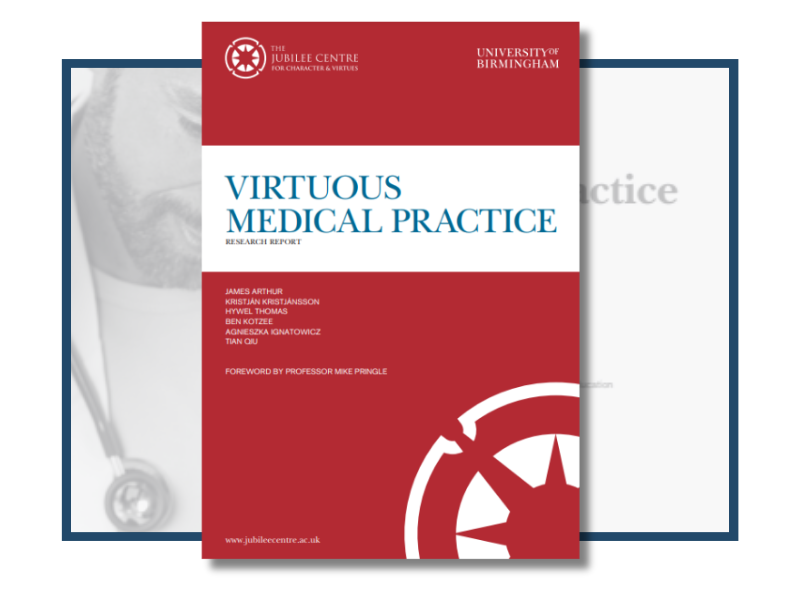Project Overview
The Virtuous Medical Practice research report was launched by Professor David Haslam, Chairman of the National Institute of Health and Care Excellence, on Wednesday 14th January 2015, at the Royal College of General Practitioners. This project investigated the place of character and virtues, training and professional practice in medicine in the UK. The project aimed to identify which personal virtues medical students and experienced doctors hold and to investigate how these could influence their professional life, as compared to other values and factors. Specifically, it examined how an understanding of the virtues influences doctors’ moral thinking and possible conduct, and how the environment in which doctors train and work can influence them in becoming good doctors.

Summary of Key Findings
- Doctors and aspiring doctors at the three different career stages were in substantial agreement on the positive virtues that doctors are expected to adopt throughout their career. The top six character defining strengths are:
- Fairness
- Honesty
- Judgement
- Kindness
- Leadership
- Teamwork
- Four of these strengths – fairness, honesty, kindness and teamwork – are also listed as self-reported character strengths but respondents are less likely to rank their qualities of judgement and leadership highly.
- In explaining their thinking about ethical medical practice, experienced doctors were more likely to rely on their judgement, while those at earlier career stages were more likely to rely on rules.
- Experienced doctors were positive about many aspects of their working environment, reporting a positive perspective on their emotional involvement with their work and on the autonomy that they are accorded. Support from colleagues is an important enabling factor for ethical practice.
- Professional ethics is taught in medical schools but the emphasis is on rule-based and cognitive approaches. While the character of doctors is often recognised as important, it is not part of the formal curriculum.
- Interviewees commented on the influence of role models in their initial education and subsequent practice. These role models and the wider culture of the workplace emphasise the importance of the ‘hidden’ curriculum in shaping a doctor’s early professional identity and its later influence in the workplace.
- Studies on means of assessing medical ethics are dominated by rule-based approaches. Virtue-based approaches must take a similar route if they are to secure greater influence. The results from the ethical dilemma scenarios used in this study show the approach could provide a way to examining doctors’ moral character.
Summary of Key Recommendations
- As experienced doctors rely more on character in resolving ethical dilemmas, compared with earlier career stages, ‘literacy’ in the language of character and virtue needs to be included in the formal curriculum of initial medical education and training. Embracing a variety of ethical theories will help students make sense of the moral nuances of being a good doctor.
- Role modelling and workplace culture influence behaviour and character both in initial training and professional practice. As such, more attention should be given to informal training in moral character and senior staff should create more opportunities for reflecting on ethics in the workplace.
- Virtues and rules can be mutually enriching and regulatory guidance would be strengthened by making these relationships clearer in regulatory documents.
- Medical ethicists and educators should begin developing valid, reliable and fair means to assess doctors’ moral character. Ethical dilemma scenarios provide a promising approach.
Appendices
This section contains online appendices for the Virtuous Medical Practice research report.
Interview Schedule – Beginning Undergraduates
Interview Schedule – Beginning Employment
